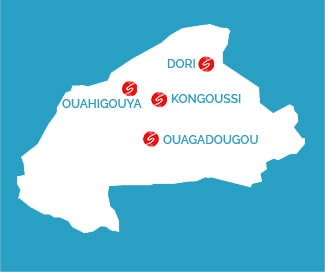On the 30th of September, Burkina Faso was rocked by a new coup d’état only a few months after the overthrow of President Kaboré and the establishment of a civilian-military transitional government. This new putsch, “motivated”, according to those responsible, by the continuing deterioration of the security situation in the country, came a few days after an armed group attacked a supply convoy on its way to the town of Djibo. At least eleven soldiers were killed, while around fifty civilians are still missing.
This political crisis is all the more worrying as it is likely to have a severe impact on hundreds of thousands of households, which have already been weakened by numerous hardships: the economic crisis in which the country is plunged, the global food crisis, growing insecurity and climatic disasters in particular. This has recently been compounded by the blockades of several towns, including Djibo and Sebba, which are in the heart of the Sahel region, the epicentre of the security crisis. For several months, these blockades have cut off the population’s access to vital goods (water, food, medicines, shelter, etc.), and have severely reduced access for humanitarian aid in these areas.
In Djibo, the capital of the Soum province in the Sahel region, the population has been receiving supplies in dribs and drabs for more than seven months, caught between hunger and thirst. The last large convoy of supplies to the town never reached its destination.
In Sebba, the capital of Yagha province in the Sahel, the food and nutrition situation is worsening and growing insecurity has led to the closure of several health centres. The health system, already suffering from a crucial lack of staff and funding, no longer has the capacity to cover the most urgent needs. This situation reduces the chances of survival of the most vulnerable populations in the face of malnutrition, waterborne diseases, malaria, maternal and neonatal mortality, etc.
Faced with these difficulties, SOLIDARITÉS INTERNATIONAL is continuing its actions in the field and adapting its humanitarian response. In Djibo, the teams are distributing money to meet food needs. “In a blockade situation, food distributions are difficult to carry out, so we are distributing money so that people can get the few resources available on the local markets,” explains
Burkina Faso
Context and action- 21.8 million inhabitants
- 184th out of 191 countries on the Human Development Index
- 600.785 people helped
Philippe Dianou, head of SOLIDARITÉS INTERNATIONAL’s “food security and livelihoods” activities in Burkina Faso. Our teams have also distributed ‘discreet’ water filters to limit the risk of vandalisation.
In Sebba, our NGO, in collaboration with Première Urgence Internationale, is working to strengthen health structures and reduce malnutrition. This programme, financed by the European Union Humanitarian Aid Office (ECHO), is based on the distribution of enriched flour, screening for malnutrition in children, repairing water infrastructures in health structures and raising awareness among the population of good food and nutritional practices.
However, it is becoming increasingly difficult for our teams to access populations in need. There are more and more areas of intervention that are inaccessible by road. In addition, the disruption of UN-chartered flights due to the recent coup d’état and the Ukrainian crisis also raises the question of the viability of using the air route. The number of people living under blockade and in need of emergency assistance is increasing. “Without rapid changes in access to these areas, and the possibility for large-scale humanitarian convoys to reach the population, the deterioration of the security and political situation will have dramatic effects,” concludes Philippe Dianou.
The humanitarian situation in Burkina Faso is very critical: 4.9 million people need aid according to the UN. In April 2022, the official OCHA/CONASUR count indicated that 1.5 million people were internally displaced, including 285,000 in Djibo. By October 2022, humanitarian organisations estimated that the number of IDPs was now close to 2 million.

